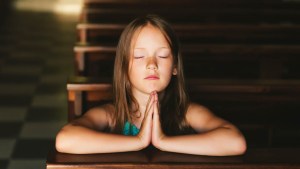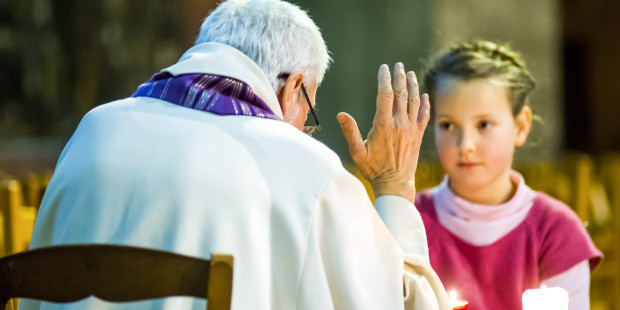Young children have a natural ability to connect with the Lord. This is a good reason not to delay in familiarizing them from a very young age with the Sacrament of Penance, which is typically received right before First Communion in the United States.
“Teaching them to go to confession early, at an early age, means giving them a jump start on a whole sacramental life,” says Abbot Garnier, a priest and author in France. “The sacraments become integrated into their journey of holiness, and this allows the Good Lord to sanctify their soul as a child. When the child is older, he or she will have acquired the habit of regular confession.”
This echoes the speech of Pope John Paul II to the bishops of Quebec (1999): “Childhood is an important period for the discovery of human, moral and spiritual values.”

Read more:
A step-by-step Confession guide for children
So from what age can or should a child go to confession?
The Church says that “every member of the faithful who has come to the use of reason is obliged to confess his or her grave sins faithfully at least once a year” (Canon 989 of the Code of Canon Law). This “age of discretion” or “age of reason” is around 7 years old, “perhaps a bit above or maybe even under,” as Pope St. Pius X stated in his decree Quam singulari on the communion of children. “It is a process of thought,” says Abbot Garnier. “It can be earlier for some. Parents must take the spiritual lead to awaken their child’s moral conscience. Then they can make a bond with a priest.”
“Take the spiritual lead.” This is a beautiful formula that reminds us that the religious education of our children is not limited to saying the bedtime prayer together, or relying solely on the support of the school or the religious education group to deal with the question of confession and the preparation for the first communion.
The support of the parents
“Children no longer receive this first education from their parents, which greatly facilitated our task,” lamented Fr. Timon-David as early as the 19th century. The formula may seem old-fashioned, but it is still relevant today. As part of the board of trustees he is in charge of, Fr. Grégoire Leroux stresses the difficulty of initiating children into confession “if they are not accompanied by their parents and are not immersed in a regular environment of practice.”
Fr. Philippe de Maistre, general chaplain of Lycée Stanislas School in Paris, distinguishes several stages in the emergence of child consciousness, a kind of X-ray of spiritual life that helps us better support them. As he says, there is “an awareness of God’s love that precedes the awareness of good and evil. Around the age of 5 or 6, there is an awakening of their interiority.” Children experience the intimate presence of Jesus.
St. Therese said that “the kingdom of God is within us.” As a child, she believed more in Heaven than in the real people around her. From baptism onwards, children have a natural and compelling relationship with their inner life and Heaven. Therefore, we must awaken their attention to this presence which is none other than the voice of conscience: “Listen to what Jesus is saying to you.” At the Stanislas school, children are encouraged to go to confession from the age of 5. “It is a confession in the context of love that allows them to both marvel at this divine presence and realize, little by little, that their life does not refer only to an external authority (that of their parents), but to an internal one.”
Then the awareness of good and evil develops. This is the moment when the child truly experiences a relationship of good and evil before God. “It is important to refer this moral conscience to the presence of God in them,” advises Father de Maistre, who explains: “When you do something good in secret, you feel good, it is Jesus who manifests his presence. When you do something bad, you are sad, because you have not listened to Jesus, you have said no, and then He is sad.” From then on, the child understands what sin is: it is not just breaking the rules, but something that turns away from the love of God.
Parable of the prodigal son
We need to explain that God loves them infinitely and always forgives us if we hurt Him, on the condition that we ask his forgiveness through a priest and decide not to do it again. The parable of the prodigal son is ideal for teaching what confession is about: the father who receives his repentant son with open arms. These reunions have, therefore, a joyful character. “It means going to meet the Father who reconciles, who forgives and who celebrates,” summarizes Pope Francis.
Later, we will “relate sin and the sacrament of forgiveness to the passion of Christ, the savior of souls,” says Abbot Garnier, explaining that “all sin is like a thorn piercing the head of Jesus” and that “to confess our sins is to unnail Jesus from the cross, as the Curé of Ars said.”
Finally, parents should help their children examine their conscience for the first time “without suggesting ideas, but telling them: ask yourself what sins you have committed. Parents must respect that space that escapes them, but also prepare their children, accompany them to the threshold,” recommends Fr. De Maistre. And set a time frame the way your schedule a doctor’s appointment. The best thing is to go to confession as a family, as Fr. Leroux recommends.
Élisabeth Caillemer

Read more:
Why it’s a blessing for children to know that their father goes to confession

